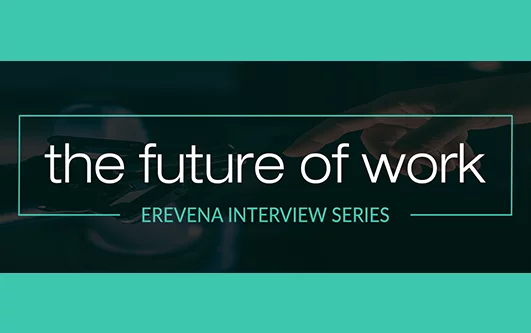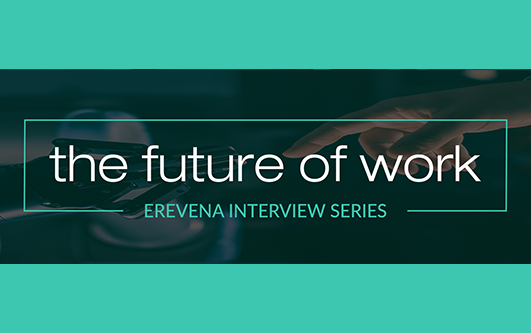Mathew Lodge, CEO at Diffblue, believes the company is on the threshold of an era as significant as the Industrial Revolution. He talks to Hazel Mulhare, Partner at Erevena, about the phenomenal impact that artificial intelligence (AI) will have on software testing and its potential to transform the future of work in the broader software development industry.
Tell us a little bit about your background
I joined Diffblue as CEO in August 2019, having spent most of my career in Silicon Valley. I have held various product and developer roles in both big tech firms and smaller (venture funded) companies. Most recently, I held the position of Senior Vice President of Products & Marketing at open source and data science innovator Anaconda.
What’s the story behind Diffblue and its raison d’être?
It’s well known that Diffblue spun out of the University of Oxford in 2016 and received the largest AI Series A funding in Europe in 2017, led by Goldman Sachs Growth. Oxford has an ambition to be like other universities that have spawned successful start-ups. Diffblue’s founders had some 20 years’ experience in research and spotted an opportunity to change the way software was being developed using AI.
Why does software development need to change?
It is ironic that software is a cornerstone of digital transformation, yet virtually all software remains hand crafted today. The challenge now is that there is a huge and growing demand for software, with which manual ways of working simply won’t keep pace. That’s where AI comes in. It has reached a point where AI is better at doing certain things than humans. For example, it has transformed image recognition, such as in radiology where it can spot tumours that a human eye might miss. The same applies in software development where AI can take over tedious, detail-oriented repetitive tasks, such as writing tests, and do them with great accuracy – and speed.
How is Diffblue using AI?
Our AI automatically generates regression tests for Java code, enabling development teams to deliver higher quality software, faster. Instead of having to write code to check your own code, the product scans it and writes tests that can find bugs in future changes. There’s currently a strong skew towards using this in the Financial Services sector, which has a lot of high-value applications, software and systems. Banks are now run by their software! But we’re also seeing use cases across other industries, such as manufacturing and telecoms.
Have you got any tangible results you can share with us?
Goldman Sachs was one of our Series A investors and became our pilot customer. In one project alone, we performed around 3,000 tests in just eight hours. That amounts to a saving of 263 days’ developer time a year or the equivalent (based on an average salary) of around $85K. It’s a huge return on investment but, for Goldman Sachs, the value is about time rather than saving money. It’s about speed to market. They face stiff competition from FinTechs and the tech giants like Google, so the faster they can test, the more competitive they are.
Can you quantify the impact of AI on your users?
Attitudes in the developer community are changing. There have been attempts to do this before, but these did not take into account what the developers thought. They typically have to maintain the tests, and previous machine-written tests were hard to read and update. Now, however, our AI writes human-like tests and updates them automatically, which takes the maintenance stress away from the developers. This drives greater acceptance amongst the developer community, who would rather spend their time developing new software. The key is that in most cases AI is not making people redundant, it is making them more productive.
Have there been any inhibitors to your growth?
Nobody has done this before. It is a new category of software, so people don’t know what to expect. This had the potential to slow things down, so we launched our Community Edition, which is a free open source test-writing tool. This gives developers an opportunity to see that it works and that it works in the right way. We felt giving people an opportunity to experience the tool in this way was important – it’s a form of bottom up demand generation.
How do you go about attracting the talent you need to drive this growth?
We are solving an important problem and that makes us interesting. Plus, it helps that they get to work with a lot of smart people and PhDs with a passion for their subject. Perhaps surprisingly, COVID-19 has also created a talent opportunity for us. We are now 100% remote. We went from everyone being in the office every day, to remote working in a week. I was incredibly proud of the team for making this happen so fast. This is an advantage for us in that it enables us to hire more people because they don’t have to be in the Oxford area to join us.
What cultural or social aspects of your shift to remote working have you had to manage?
We had everything in place before we made the move, with collaboration tools such as Slack, Zoom and the Google toolset, so we were ready to go quickly. In just a few instances where someone didn’t have a laptop, it was easy to get them one. Socially, while people are happy to be remote, we are also trying to find ways to get people to meet up safely. Getting people together is an irreplaceable aspect of work, especially for those hired in lockdown that we have not yet met.
Looking ahead, I see this as a permanent shift to more remote working, but it must be structured in a way that works for the company and for the employees. A structured rhythm and cadence to how we work is important. We have already seen that some people find it hard to work remotely, so we have enabled them to co-locate in an office where they can be socially distanced.
What do you see as the future of AI in software development?
This is game-changing for the developer community. There is already a broad spread of code-writing tasks where AI can take over tedious, error-prone things like bug fixing. This works better when you have regression tests to ensure a fix works and remains secure. Given its huge popularity in enterprise software, we initially picked Java as the development language, but are now looking to support other languages, which will be a growth area for us.
The impact on the industry going forward will be transformational. I liken it to the Industrial Revolution. For example, think about what industrialised weaving did for the way people dressed. The sudden availability of new fabrics produced in high volumes changed what people wore for good. Our application of AI represents a similarly massive transformation.
“This is game changing for the developer community and the impact on the industry going forward will be transformational.”
But the potential for our application of AI is about more than just testing. Developers will move towards embedding AI into the software itself. And the industry is moving fast. AI can solve problems where it’s impossible to look at all the alternatives by conducting probabilistic search, finding new outcomes.
So, is it all about speed?
Software testing has traditionally happened at the end of software development – the quality assurance of a system before it is released after development was “done”. Now, however, AI means we can have regression tests that run at the time the code is written, so problems are found and fixed much faster. That enables software teams to go much faster. And, in business, the fast movers will beat the slow. Companies that can adapt quickly and pivot into new ways of selling and serving customers can drive growth. That’s what AI enables.
Hazel Mulhare is Partner at Erevena, an Executive Search firm focused on high growth and transformation. Erevena’s clients are amongst the fastest growing companies in the world: they are VC & growth equity backed; they are publicly traded & privately held companies transforming to grow. Hazel focuses on early-stage technology businesses, with a particular interest in Health and Deep tech. She works with founders to make key C-level, VP and Board level hires at seed, series A and series B stage.
Share this article:













